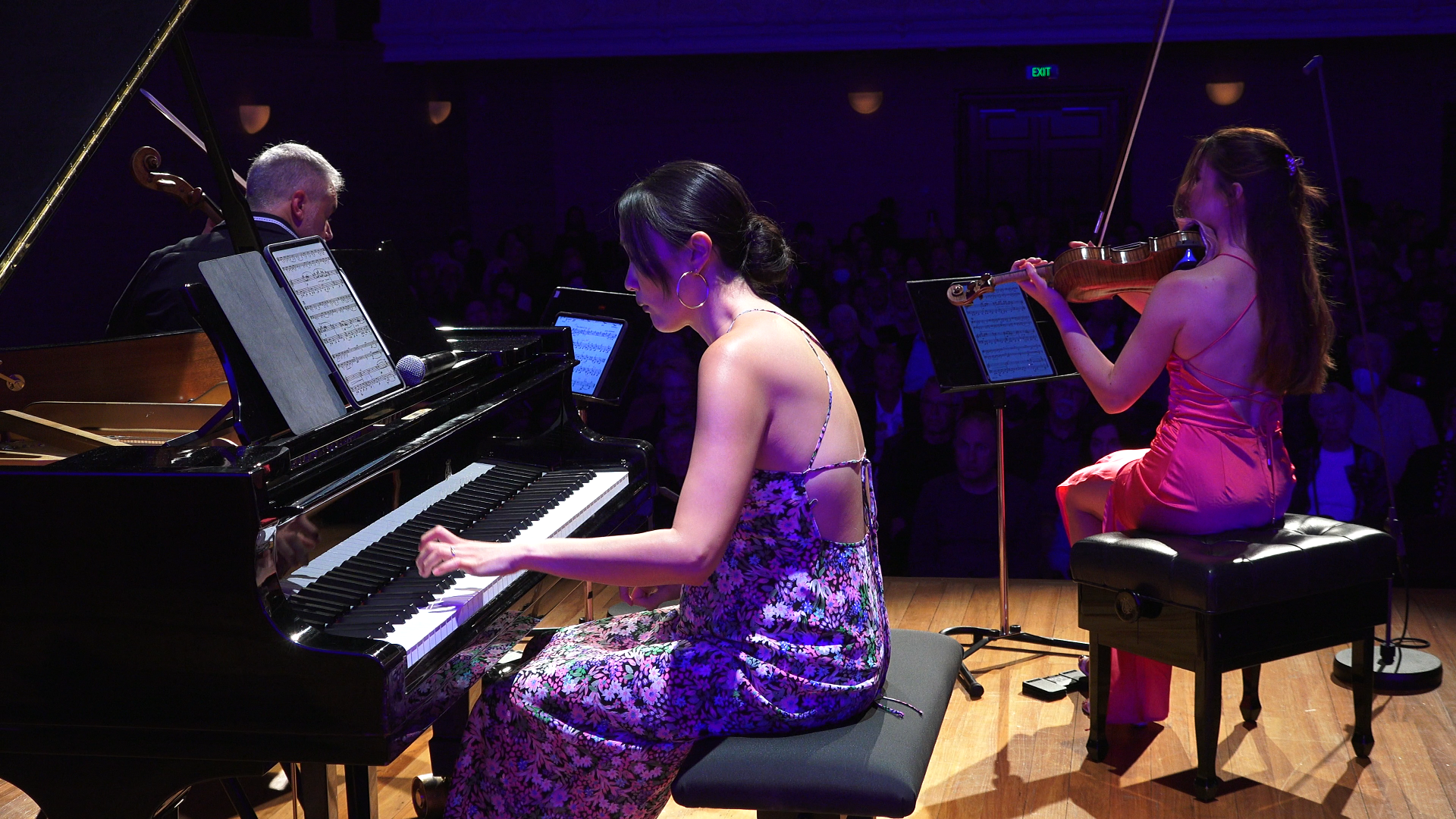NZTrio Loft Series 2017
14nov7:00 pmNZTrio Loft Series 2017SOAR: Performance 2
Event Details
Programme: John Ireland (ENG): Phantasie Trio in a minor Anthony Ritchie (NZ): Childhood Dorothy Ker (NZ): Onaia INTERVAL Schubert (AUSTRIA): Piano Trio in E Flat major, op. 100 Soar prepares us for new heights
Event Details
Programme:
John Ireland (ENG): Phantasie Trio in a minor
Anthony Ritchie (NZ): Childhood
Dorothy Ker (NZ): Onaia
INTERVAL
Schubert (AUSTRIA): Piano Trio in E Flat major, op. 100
Soar prepares us for new heights and perspectives. Weaving through changing tapestries, you’ll find yourself adrift in daydreams (John Ireland) where life’s complexity is seemingly simplified (Anthony Ritchie), primordial soundscapes pacify (Dorothy Ker), and naivety is blissfully deliberate like a game of hide and seek (Franz Schubert).
BOOK NOW ($50Adult/$25 Student)
Time
November 14, 2017 7:00 pm(GMT+00:00)
Location
Loft at Q
Organizer
Programme Notes
John Ireland (ENG; 1879 – 1962): Phantasie Trio in a minor – c. 12’
in tempo moderato – allegro – Tempo I – Animando – Meno mosso, quasi andantino – Tempo I – vivace e ritmico – In tempo – Vivace e giocoso – Vivacissimo
This lovely trio is another of those that owe their life to Walter Willson Cobbett, the British businessman who was mad about chamber music and, in 1905, established the Cobbett prize for works in one single movement with plenty of contrast and equal parts for the instruments – in the manner of an Elizabethan fantasy.
John Ireland entered this in 1906, aged 27, when he was organist and choirmaster of a church in Chelsea and was beginning to make his name as a composer. He’s a melancholy figure: his father was 70 when he was born, and he was left orphaned when first his mother then his father died in quick succession when he was still in his early teens. All his life he struck up doomed relationships with women who were 30 years younger, his one brief marriage was a disaster and he became something of a recluse, eventually retreating into a converted windmill in the depths of the Sussex countryside and declining the award of a CBE. One of his colleagues – he taught at the Royal College of Music, where he’d studied – described him as “a self-critical, introspective man, haunted by memories of a sad childhood”, and he spent a lot of time in the Channel Islands where he became known for going on great long walks alone. And yet, still waters run deep! His epitaph reads “Many waters cannot quench love”.
You fancy that you can hear that in this trio. Deeply passionate and impressionistic – Ireland adored Debussy and Ravel and more or less invented “English impressionism” – it teems with the sort of melody and emotion that Ireland poured into his songs, passing through several changes in the mood, true to the brief, and racing “playfully” to the end. It was pipped to the post by Frank Bridge in the prize that year, coming second, but it was enough to encourage Ireland to write more. A few years later he did win with his first violin sonata and was on the road to fame.
Anthony Ritchie (NZ; b.1960): Childhood – c. 10’
Anthony Ritchie studied composition at Canterbury University, and completed a Ph.D on the music of Bartok. He studied composition at the Liszt Academy in Hungary, before becoming Composer-in-Schools in Christchurch, in 1987. He moved to Dunedin in 1988 to be Mozart Fellow in composition, at Otago University, and later was Composer-in-residence with the Dunedin Sinfonia completing his Symphony No. 1 Boum.
He freelanced from 1995-2002, writing many commissioned works for performers as diverse as the New Zealand Symphony Orchestra, Class Act Opera, and The Australian Song Company. In 2000 his Symphony No.2 was premiered by The Auckland Philharmonia at the International Festival of the Arts. The comic opera “Quartet” also featured at the 2004 Festival. Anthony Ritchie has composed film music in collaboration with Natural History NZ, including “Southern Journeys” (2000). In 2004 his opera “The God Boy” was a critically acclaimed success at the Otago Festival of the Arts.
His work is increasingly known overseas: in 2014 A Bugle Will Do was recorded by the BBC Symphony Orchestra and performed by The Ulster Orchestra, and Salaam was premiered by the Belgium choir Aquarius. Most recently, his oratorio Gallipoli to the Somme was premiered to critical acclaim in New Zealand and will be performed in London in 2018. He is currently Associate Professor of Music at Otago University.
Childhood was composed for NZTrio as part of the composer’s sabbatical leave from The University of Otago, for performances in 2017 and beyond. The composer acknowledges the support and assistance of the performers in the trio, Justine Cormack, Ashley Brown and Sarah Watkins.
The piece reflects on different stages in life, and makes connections between our own childhood and that of our children, and indeed our grandchildren. Observing and relating to children is like a renewal of hope and wonder, that counterbalances the experiences and tribulations of adult life. Therefore, the style of the music is deliberately naïve and simple, while also containing undercurrents of complexity.
An opening progression of a tone gradually expands and unfolds into dual pentatonic scales on the piano. The strings enter with a basic open 5th progression that grows into a short theme. This theme forms the basis for much of the material that follows, almost in the manner of a theme and variations. A third ingredient emerges after letter E, a chord progression that ascends on the piano. An ABAB structure is established leading to a climax, and a new variation on the main theme appearing at letter K. This tantrum-like idea suddenly switches to a calming, neutral theme at bar 182, and this pattern repeats, and these two sharply contrasting sections alternate. The ‘calming’ idea eventually takes over at letter P, and is developed. However, an echo of the tantrum-like idea sounds at letter S, with primitive, percussive progressions on the piano. The music’s energy winds down, with violin and cello developing a soulful duo. There are reminders of earlier piano arpeggios before the child-like texture of the opening returns to end the piece.
Dorothy Ker (NZ; b. 1965): Onaia – c. 15’
Dorothy Ker’s music is performed and broadcast in both hemispheres and has been heard at venues and international festivals in Auckland, Belfast, Darmstadt, Huddersfield, Perth, Taipei, Seoul, at the ISCM, and London. In 1992 she immigrated to the UK, where she studied with Nicola Lefanu and Harrison Birtwistle, completing a PhD at York University in 1998. Her studies were followed by Research Fellowships at Reading University (2001-2004) and Sheffield University (2005-2010), where she is currently a Senior Lecturer. In 2013-2014 she was resident at the Douglas Lilburn House while on study leave. In 2015 she was awarded the Composers Association of NZ Trust Fund Award for her contribution to New Zealand music.
Dorothy writes: “Onaia stream (near Rotorua/Te Puke) passes through a narrow gully, where it is possible to wade barefoot through the shallow waters, going deeper and deeper into the high banks and ancient foliage, for several hours. Onaia is not a depiction of that place (nor a journey through it) but a translation of its energies. The sounds are not from there but make a visceral connection to it, playing with patterns and resonances, and with various qualities of surface and touch. The piece falls in pitch from extreme height to the deepest available pitch, a musical journey that might be understood as the unravelling of a single, stratified, spectrum of texture and resonance.”
Onaia is a co-commission from Fidelio Trio and NZTrio, with funding provided by Creative New Zealand. It was composed while Dorothy was in residence at the Lilburn House in Wellington, NZ, while on Study Leave from the University from Sheffield in 2013-2014.
Franz Schubert (AUSTRIA; 1797 – 1828); Piano Trio No. 2 in E flat Major, D.929 Op. 100 – c. 43’
Allegro
Andante con moto
Scherzando. Allegro moderato
Allegro moderato
There was a time when I talked unwillingly of Schubert, whose name, I thought, should only be whispered at night to the trees and stars. – Robert Schumann
This divine trio is one of the last things Schubert ever wrote. It was also one of the very few of his works ever performed in public, at the one and only public concert during his lifetime, and the only one ever published outside Vienna. The great irony of his genius was that despite how hugely prolific he was – more than 1,500 works including massive quantities of piano and chamber music, nine symphonies and over 600 songs – Schubert lived his whole life unrecognised by all but his small circle in Vienna: he had no post, no patron, received no commissions, made hardly any money, performed only in private, gave a lot of it away, and his music quickly became scattered far and wide among his publishers, family and friends. Not even Brahms, who idolised him, had any idea of the true quantity of his output and it was four decades before he began to be appreciated in the way that he deserved.
The E-flat trio is dated November 1827. He was already ill: diagnosed as typhoid fever at the time, it now is certain to have been syphilis, which had plagued him intermittently for years and which plunged him into the occasional depressions that so transcendently work their way into his songs. In March he had been a torchbearer at Beethoven’s funeral: the following November, 1828 at the age of only 31, he was dead. And yet that year is one full of masterpieces – Schwanengesang, the great C major symphony, the last set of impromptus, both piano trios, the C major quintet. He wrote both trios in quick succession and they are companion pieces: the B-flat sunny and lyrical, the E-flat dark and dramatic, and the one that Schubert himself preferred. He worked unusually hard on it – the manuscript is full of changes – and when it was ready to send to his publisher he gave it such a moving dedication. “Dedicated to no one, save those who find pleasure in it”.
It grabs our attention immediately. High drama combines with Schubert’s unmatched and endless gift for melody, especially in the heart-rending slow movement: the scherzo and trio are brilliantly impish and witty; and he excels even himself in a final movement of incomparable brilliance and beauty. Schubert has sometimes been criticised for not paying enough attention to formal structure, his melodies are so beautiful, but this trio utterly gives the lie to that. As Liszt once said, “Such is the spell of your emotional world that it very nearly blinds us to the greatness of your craftsmanship.”
Programme note for Piano Trio in E flat coming soon….


